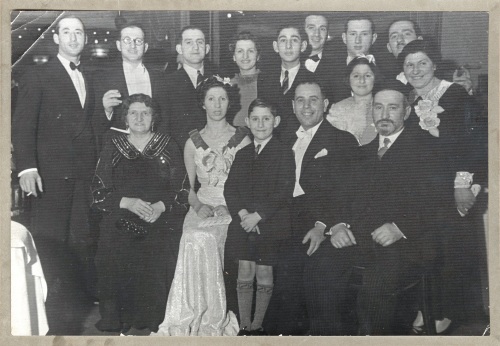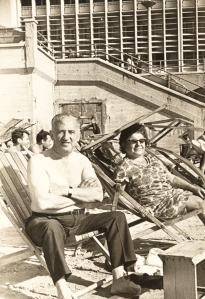If pushed to give my primary reason for, on a good day (i.e., when I haven’t been induced into spasm by some impudent native), preferring life in Israel to that in the UK, then pipping even the food, weather and women (in ascending order of hotness) would have to be the rich tapestry of Jewish life here. In spite of our many detractors (and, indeed, problems), the short history of Israel has been one of startling achievement in almost every field, not least of which has been the absorption of so many disparate edot (ethnic groups) – each with its own distinctive culture and traditions – into such a remarkably united (even if we wish it were more so) whole.
But whenever attempting to relate my experiences of, for instance, Moroccan or Yemenite Jews, and especially of their womenfolk, to an Anglo Jew, I am met with a blank expression (one that Part II will attempt to address). The vast majority of British Jews lack any frame of reference in this regard, hailing from or having their origins in Poland, Galicia (today straddling Poland and Ukraine), Russia, the Baltics, Germany, and, to a lesser extent, Hungary. And, growing up in North-West London, the very marginal differences between such Jews could only be discerned from their particular shuls or shtiebls (large and small synagogues) if they had them (most now don’t), from their Shabbos meals, though mainly from their own peculiar – in both senses – sense of identity.
So, in the Isaacson household, for example, my father, of Lithuanian extraction, always appeared to delight in highlighting (in good humour, mind) the intellectual and cultural inferiority of the Galicianer Reiss family into which he had married. The Litvak, he was certain, constituted the very “cream” of European Jewry. Indeed, my father’s claim has always seemed to me to be somewhat justified, the Litvak misnagdim appearing, on the one hand, more enlightened (almost by definition) than the hassidic Galicianers, whilst, on the other, somehow more human than the anally-challenged German Yekkes. (In contrast to most Jewish immigrants to the UK, who arrived immediately before and after the turn of the last century, the majority of Hungarian Jews did not escape the Holocaust and were perhaps, therefore, considered beyond, even light-hearted, stereotype.)
The sickening history of anti-Semitism in Eastern Europe, however, made the “Old Country” a delicate subject for all immigrants. Even though they escaped Lithuania and Galicia around two and three decades, respectively, before the rise of Hitler, my parents never heard their parents or grandparents talk about the pogroms and persecutions that they had suffered in their backward, Jew-hating hellholes. Anyway, there is far more that unites Ashkenazi (European) Jews than separates them. And the differences between them would be no more recognisable to the outsider – or even to most other Jews – than those between, for instance, British Muslims of Bangladeshi extraction and those from Pakistan.
A relatively small community of Sephardic Jews – of primarily Middle Eastern and North African descent – added some much-needed colour to the rather pallid complexion of Anglo-Jewish life. My exposure was to the, largely Indian, Sephardic community of Hendon, to the Adenites of Stamford Hill (many of whom attended Hasmonean Grammar School for Boys), and to a smattering of Moroccans, Egyptians, Iraqis and Persians (most of whom had escaped the 1979 Islamic Revolution, wisely with little more than their carpets).
And these Sephardim brought a lot to the table. Quite literally. Their mealtime plenty was quite an eye-opener for the Anglo Jew, in whose kitchen meticulous Shabbos potato allocation was carried out on a Thursday morning. Blessed with an Egyptian aunt, however, I was spared a childhood of exclusively (miserably bland) Ashkenazi fare (though even that was an improvement on traditional English grub). Wary not to injure his daughter’s (my mother’s) feelings, my grandfather would play months of ‘chess’ with the food she had deposited in his freezer, while my aunt’s wasn’t even given time to ice over.
The door policy, too, operated in Sephardic households was significantly more relaxed, with strays wandering in and out without any requirement for advance written invitation. This was a real culture shock for the Anglo Jew, who ‘greeted’ every unexpected knock at the door – which, even after positive identification, still wasn’t always opened – with a suspicious glance through translucent curtains or a built-in, magnifying peephole.
Perhaps in their attempt to blend in, however, the differences between these various Sephardic ethnicities and cultures were rarely visible to, or experienced by, their Ashkenazi ‘hosts’. And, beyond the puerile mimicking of the ‘funny’ accents of our new Persian classmates, I was never aware of any racism towards, or even light-hearted stereotyping of, our darker brothers. Indeed, many of them easily assimilated into Raleigh Close, Hendon’s very traditional United Synagogue. Moreover, the fact that the biggest “lout/wretch” (to quote the Legendary Swansean) in our school year was Morocco born and bred was neither here nor there.
In Israel, however, the richness of Jewish multi-ethnicity is celebrated, nurtured, and flourishes. And the deliciously incorrect sense of humour enjoyed here, thriving on ethnic excess and eccentricity (this kinda thing), simply could not exist without the edot. Is there anything to the inevitable, resulting stereotypes? You betcha!! And don’t believe anyone who – serving his or, of course, her ‘god’ of political correctness – tells you otherwise.
[Next on melchett mike: The Edot (Part II): Ethnic Yentzing in Palestine. If you are offended by generalisations, and un-PC ones at that, then give it a miss. Anyway, you are probably on the wrong blog . . .]













